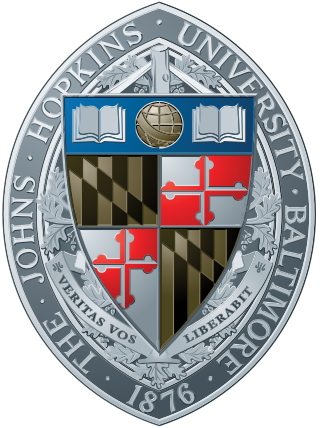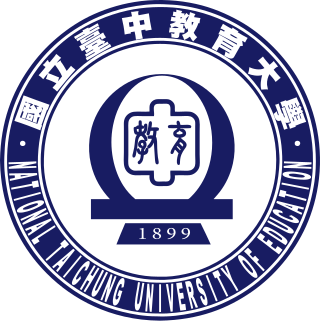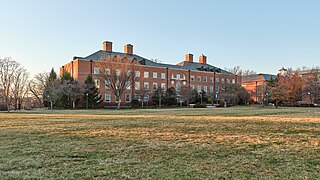
Johns Hopkins University is a private research university in Baltimore, Maryland, United States. Founded in 1876, Johns Hopkins was the first American university based on the European research institution model. The university also has graduate campuses in Italy, China, and Washington, D.C. It is considered to be the first research university in the U.S. and has been the national leader in annual research and development spending since the late 20th century.

The Cornell University College of Arts and Sciences is an academic college at Cornell University. It has been part of the university since its founding in 1865, although its name has changed over time. It is the largest of Cornell University's colleges and schools with 4,251 undergraduate and 1,301 students and 526 faculty.

The Johns Hopkins University School of Medicine (JHUSOM) is the medical school of Johns Hopkins University, a private research university in Baltimore, Maryland. Founded in 1893, the School of Medicine shares a campus with Johns Hopkins Hospital and Johns Hopkins Children's Center, established in 1889.
The Faculty of Arts and Sciences is the largest of all faculties at Queen's University at Kingston, and one of the original three faculties that founded the school in 1841.

The Yale Graduate School of Arts and Sciences is the graduate school of Yale University. Founded in 1847, it is the oldest graduate school in North America, and was the first North American graduate school to confer a Doctor of Philosophy (Ph.D.) degree.
The University of Pennsylvania School of Arts and Sciences is the academic institution encompassing the humanities, social sciences, and natural sciences at the University of Pennsylvania.
The MIT School of Humanities, Arts, and Social Sciences (SHASS) is one of the five schools of the Massachusetts Institute of Technology, located in Cambridge, Massachusetts, US. The school includes 11 academic areas and works alongside six departments, labs, and programs. SHASS grants SB, SM, and PhD degrees. Major fields of study include anthropology, comparative media studies and writing, economics, history, linguistics, literature, music, philosophy, political science, science, technology, and society, and theater arts. Other programs include the Center for International Studies; Knight Science Journalism; Science, Technology, and Society; Security Studies; and HyperStudio.

The National Taichung University of Education is a university in West District, Taichung, Taiwan. Founded in 1899 at the Confucian Temple in Changhwa county, it moved to the current site in 1923.

Tamar Szabó Gendler is an American academic and philosopher. She has been the Dean of the Faculty of Arts and Sciences at Yale University, where she is also the Vincent J. Scully Professor of Philosophy and a Professor of Psychology and Cognitive Sciences. Her academic research focuses on issues in philosophical psychology, epistemology, metaphysics, and areas related to philosophical methodology.
The University of Colombo currently has seven faculties with 41 academic departments and two interdependent schools with five academic departments. All faculties and schools carries out courses of study and research in both graduate and undergraduate studies. In addition, the university has several institutions that specialize in different areas of research.
The College of Arts and Sciences (A&S) is the liberal arts and sciences unit of the University of Kentucky, located in Lexington, Kentucky. It is primarily divided between the natural sciences, social sciences, and humanities, and offers more than thirty degree options for both undergraduate and graduate students.

The King's College London Faculty of Arts & Humanities is one of the nine academic Faculties of study of King's College London. It is situated on the Strand in the heart of central London, in the vicinity of many renowned cultural institutions with which the Faculty has close links, including the British Museum, Shakespeare's Globe, the National Portrait Gallery and the British Library. In the 2024 Times Higher Education World University Rankings by subject, King's Arts & Humanities ranked in the top twenty worldwide.
Founded in 1947, the Johns Hopkins Writing Seminars is an academic program offering undergraduate and graduate degrees in writing in the Zanvyl Krieger School of Arts & Sciences at Johns Hopkins University. It is the second-oldest creative writing program in the United States.
Taekjip Ha is a South Korean-born American biophysicist who is currently a Senior investigator and director of Program in Cellular and Molecular Medicine at Boston Children's Hospital and Professor of Pediatrics, Harvard Medical School. He was previously Bloomberg Distinguished Professor of Biophysics and Biomedical Engineering at Johns Hopkins University. He was previously the Gutgsell Professor of Physics, at University of Illinois at Urbana-Champaign where he was the principal investigator of Single Molecule Nanometry group. He is also a Howard Hughes Medical Institute investigator.
Sabine Stanley is a Canadian physicist, currently at Johns Hopkins University in the Zanvyl Krieger School of Arts and Sciences Morton K. Blaustein Department of Earth And Planetary Sciences and the Applied Physics Laboratory. She was awarded a Bloomberg Distinguished Professorship in 2017. She was previously a Canada Research Chair of Planetary Physics at University of Toronto. She was awarded the William Gilbert Award by the AGU in 2010 and was awarded a Sloan Research Fellowship in 2011.

The Johns Hopkins University Department of Biomedical Engineering has both undergraduate and graduate biomedical engineering programs located at the Johns Hopkins University in Baltimore, Maryland.

Alan Yuille is a Bloomberg Distinguished Professor of Computational Cognitive Science with appointments in the departments of Cognitive Science and Computer Science at Johns Hopkins University. Yuille develops models of vision and cognition for computers, intended for creating artificial vision systems. He studied under Stephen Hawking at Cambridge University on a PhD in theoretical physics, which he completed in 1981.
Hanna Pickard is a Canadian philosopher who specializes in the philosophy of mind, philosophy of psychiatry, moral psychology, and medical ethics. She is a Bloomberg Distinguished Professor of Philosophy and Bioethics at Johns Hopkins University with appointments in the William H. Miller III Department of Philosophy in the Zanvyl Krieger School of Arts and Sciences and the Berman Institute of Bioethics.
Ian B. Phillips is a British philosopher and Bloomberg Distinguished Professor of Philosophy and Psychological and Brain Sciences at the Johns Hopkins University, where he has taught since 2019. He has appointments in the William H. Miller III Department of Philosophy and the Department of Psychological and Brain Sciences in the Zanvyl Krieger School of Arts and Sciences. He is known for his works on the intersection of philosophy and brain science.
The Symbolic Systems Program or SymSys is a unique degree program at Stanford University for undergraduates and graduate students. It is an interdisciplinary degree encompassing the following:











